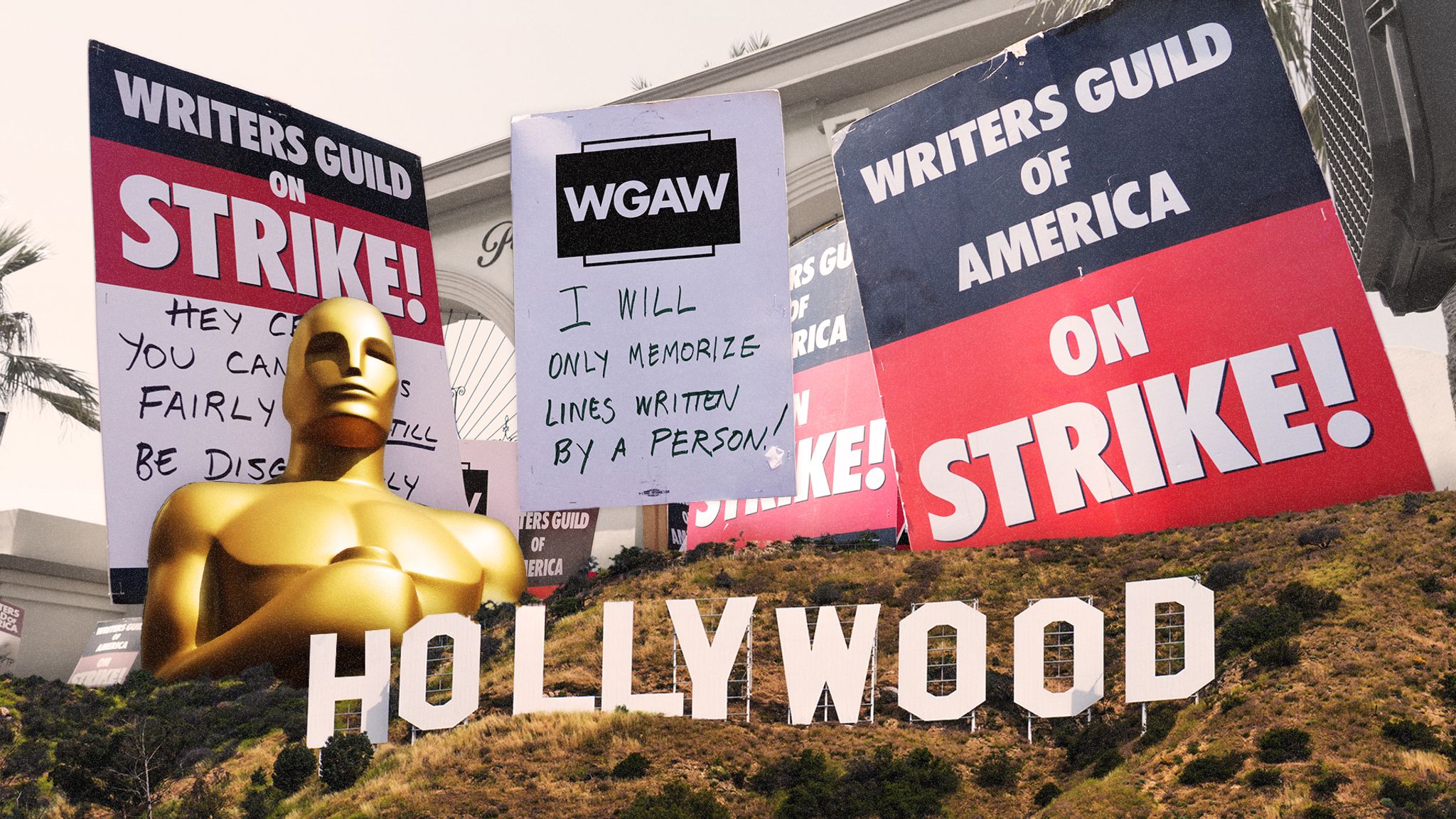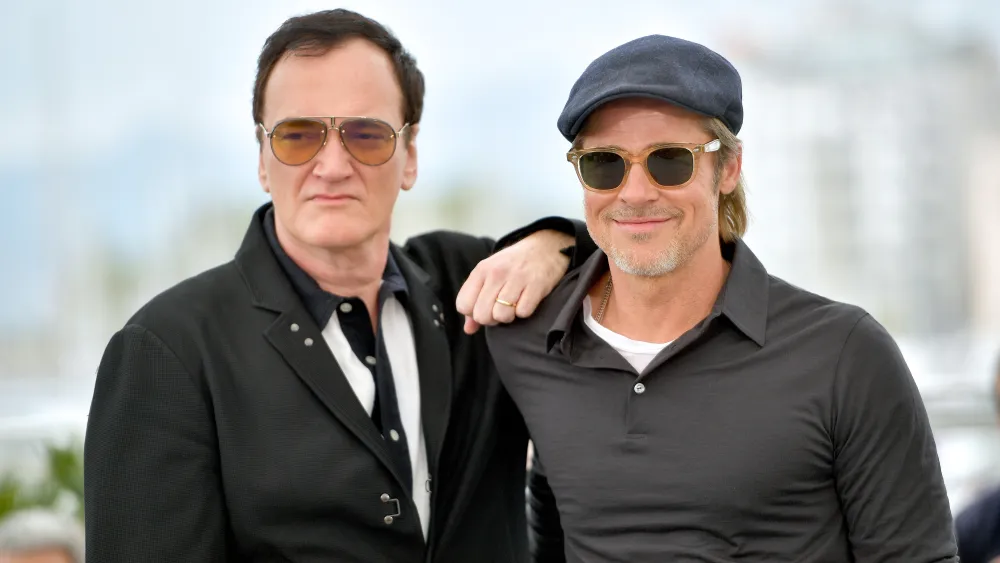Alia Bhatt will appear in Vasan Bala’s upcoming film, Jigra, and will stop at nothing to keep her brother safe. view the news release video With Vasan Bala’s Jigra, Alia Bhatt will return to the big screen in September of next year. Her own Eternal Sunshine Productions produced the movie. …
The Effects of the Hollywood Strike Felt Across Atlantic To the United kingdoms

Hollywood Unites in Historic Strike, Sending Ripples through the British Entertainment Industry
Lights, cameras, and action have come to a halt in Hollywood as members of the Screen Actors Guild – American Federation of Television and Radio Artists (SAG-AFTRA) and the Writers Guild of America (WGA) join forces in a historic strike. This historic display of unity is the first time the two big Hollywood unions have taken such action together since 1960, and its repercussions are being felt throughout the British entertainment sector.
The combined strike, spurred by worries about wages, residuals, streaming, and the role of Artificial Intelligence (AI) in filmmaking, has halted around $132 billion in film production. The demands are clear: more compensation, better working conditions, increased benefits, and more openness from streaming providers. With around 11,000 WGA members on strike since early May, they were eventually joined by 65,000 SAG-AFTRA film and television actors in mid-July, putting 160,000 members on the picket lines.
The repercussions of the Hollywood strike extend beyond the glitzy sidewalks of Los Angeles. It has spread across the Atlantic to the United Kingdom, where the entertainment industry is seeing multiple productions cease work. London, the world’s third-largest film production center, is facing the brunt of the strike. Major productions such as “Wicked” and “Deadpool 3,” both supported by Walt Disney, have been compelled to put their projects on hold until further notice. The latest to be hit by the blow are the Ghostbusters sequel and Spider-Man: Beyond the Spider-Verse with the release date pushed further.
While labor regulations in the United Kingdom restrict the British performing arts and entertainment trade union, Equity, from formally striking alongside their American counterparts, British actors and writers are demonstrating in solidarity with their American colleagues. They are convinced that SAG-AFTRA and the WGA’s success in securing their terms will benefit the entire worldwide industry.
Streaming services, lead by behemoths like Netflix, have had a substantial impact on how actors and writers get compensated, owing to declining residuals and shorter television program seasons. Furthermore, the rise of artificial intelligence has added a new level of anxiety. British actors are concerned that the incorporation of AI into filmmaking may someday replace human labor, posing a threat to the lives of film crews worldwide.
The fundamental issue is a growing imbalance inside Hollywood. Surprisingly, the actors’ union SAG-AFTRA has reported that over 80% of its members earn less than $27,000 per year, while some studio executives earn more than $100 million. The dramatic discrepancy underlines the critical need for creative employees to be treated fairly.
The stakes are rising as the strike continues. Experts describe it as an “existential strike,” one that might reshape Hollywood’s future for budding stars and seasoned professionals alike. The settlement of these important concerns will determine the fate of the entertainment business, and the Hollywood dream as we know it is at stake.
The unity demonstrated by Hollywood’s unions delivers a powerful statement at this critical juncture. It is a monument to the unshakable spirit of individuals who bring stories to life on our screens, molding them and inspiring future generations. The world is watching with bated breath as discussions between unions and the Alliance of Motion Picture and Television Producers continue, hoping for a conclusion that not only guarantees the livelihoods of creative people but also preserves the magic of cinema for years to come.
Latest New
Proud Moment for India as Kiran Rao’s Laapataa Ladies goes as an official entry for Oscars 2025! On Monday, September 23, 2024, the jury members of the Film Federation of India selected Laapataa Ladies as an official entry for the Oscars in the category of Best Foreign Film. Kiran Rao’s …
Amidst the chaos, the 55-year-old actress was seen having some me time with her kids. The recent IG post of the megastar is proof of the same. The post not only shows her daily activities but also shares a cryptic message for her ex-husband Ben Affleck. The snaps included a …
Suhani Bhatnagar, the Dangal Actress Who Portrayed Young Babita Phogat, Passes Away at Age 19: Verified by Aamir Khan Productions 19-year-old actress Suhani Bhatnagar, who gained fame for her part in the popular movie Dangal, passed away. In Dangal, Suhani was portrayed as Aamir Khan’s daughter. Suhani Bhatnagar, who portrayed …
Return Of Brad Pitt To The Cast Of The Movie Critic The writer/director has repeatedly stated that Brad Pitt will return to the cast of Quentin Tarantino’s upcoming film, “The Movie Critic” and this will be his last & final picture. For the movie, he’s reconnecting with Tarantino, according to …
Heidi Klum shows her Halloween outfit for 2023. For Halloween 2023, supermodel Heidi Klum donned a flashy peacock costume. Supermodel Heidi Klum has unveiled a breathtaking exhibition of ingenuity and flamboyance by donning a painstakingly created peacock costume for her much anticipated Halloween party, following much hoopla, suspense, and teases. …
The Rick and Morty Season 7 Trailer Unveils Justin Roiland’s Replacement Voice Actors Until the US premiere of the upcoming season, the new voice actors remained a secret. With the US premiere of Rick and Morty season 7, the voice actors who will be taking Justin Roiland’s place as co-creator …
According to reports, Netflix plans to raise its prices once the current Hollywood actors’ strike is over. According to the source, the price rise would first become effective in the US and Canada before moving elsewhere. As soon as the current Hollywood actor strikes conclude, Netflix is apparently aiming to …
In Canada, Disney+ will launch a crackdown on password sharing this November. It will soon be illegal for subscribers in Canada to share their accounts with others outside of their homes. On November 1st, Disney+ in Canada will start limiting password sharing. The region’s subscribers were informed through email that …
Day 2 box office results for Fukrey 3: Richa Chadha, Varun Sharma, Manjot Singh, and Pulkit’s movie bring in a total of 16.32 crore. The movie Fukrey 3 starring Richa Chadha, Varun Sharma, Manjot Singh, Pulkit Samrat, and Pankaj Tripathi is doing well at the box office. Box office earnings …
Alia Bhatt will appear in Vasan Bala’s upcoming film, Jigra, and will stop at nothing to keep her brother safe. view the news release video With Vasan Bala’s Jigra, Alia Bhatt will return to the big screen in September of next year. Her own Eternal Sunshine Productions produced the movie. …
Proud Moment for India as Kiran Rao’s Laapataa Ladies goes as an official entry for Oscars 2025! On Monday, September 23, 2024, the jury members of the Film Federation of India selected Laapataa Ladies as an official entry for the Oscars in the category of Best Foreign Film. Kiran Rao’s …
Amidst the chaos, the 55-year-old actress was seen having some me time with her kids. The recent IG post of the megastar is proof of the same. The post not only shows her daily activities but also shares a cryptic message for her ex-husband Ben Affleck. The snaps included a …
Suhani Bhatnagar, the Dangal Actress Who Portrayed Young Babita Phogat, Passes Away at Age 19: Verified by Aamir Khan Productions 19-year-old actress Suhani Bhatnagar, who gained fame for her part in the popular movie Dangal, passed away. In Dangal, Suhani was portrayed as Aamir Khan’s daughter. Suhani Bhatnagar, who portrayed …
Return Of Brad Pitt To The Cast Of The Movie Critic The writer/director has repeatedly stated that Brad Pitt will return to the cast of Quentin Tarantino’s upcoming film, “The Movie Critic” and this will be his last & final picture. For the movie, he’s reconnecting with Tarantino, according to …
Heidi Klum shows her Halloween outfit for 2023. For Halloween 2023, supermodel Heidi Klum donned a flashy peacock costume. Supermodel Heidi Klum has unveiled a breathtaking exhibition of ingenuity and flamboyance by donning a painstakingly created peacock costume for her much anticipated Halloween party, following much hoopla, suspense, and teases. …
The Rick and Morty Season 7 Trailer Unveils Justin Roiland’s Replacement Voice Actors Until the US premiere of the upcoming season, the new voice actors remained a secret. With the US premiere of Rick and Morty season 7, the voice actors who will be taking Justin Roiland’s place as co-creator …
According to reports, Netflix plans to raise its prices once the current Hollywood actors’ strike is over. According to the source, the price rise would first become effective in the US and Canada before moving elsewhere. As soon as the current Hollywood actor strikes conclude, Netflix is apparently aiming to …
In Canada, Disney+ will launch a crackdown on password sharing this November. It will soon be illegal for subscribers in Canada to share their accounts with others outside of their homes. On November 1st, Disney+ in Canada will start limiting password sharing. The region’s subscribers were informed through email that …
Day 2 box office results for Fukrey 3: Richa Chadha, Varun Sharma, Manjot Singh, and Pulkit’s movie bring in a total of 16.32 crore. The movie Fukrey 3 starring Richa Chadha, Varun Sharma, Manjot Singh, Pulkit Samrat, and Pankaj Tripathi is doing well at the box office. Box office earnings …
Alia Bhatt will appear in Vasan Bala’s upcoming film, Jigra, and will stop at nothing to keep her brother safe. view the news release video With Vasan Bala’s Jigra, Alia Bhatt will return to the big screen in September of next year. Her own Eternal Sunshine Productions produced the movie. …










